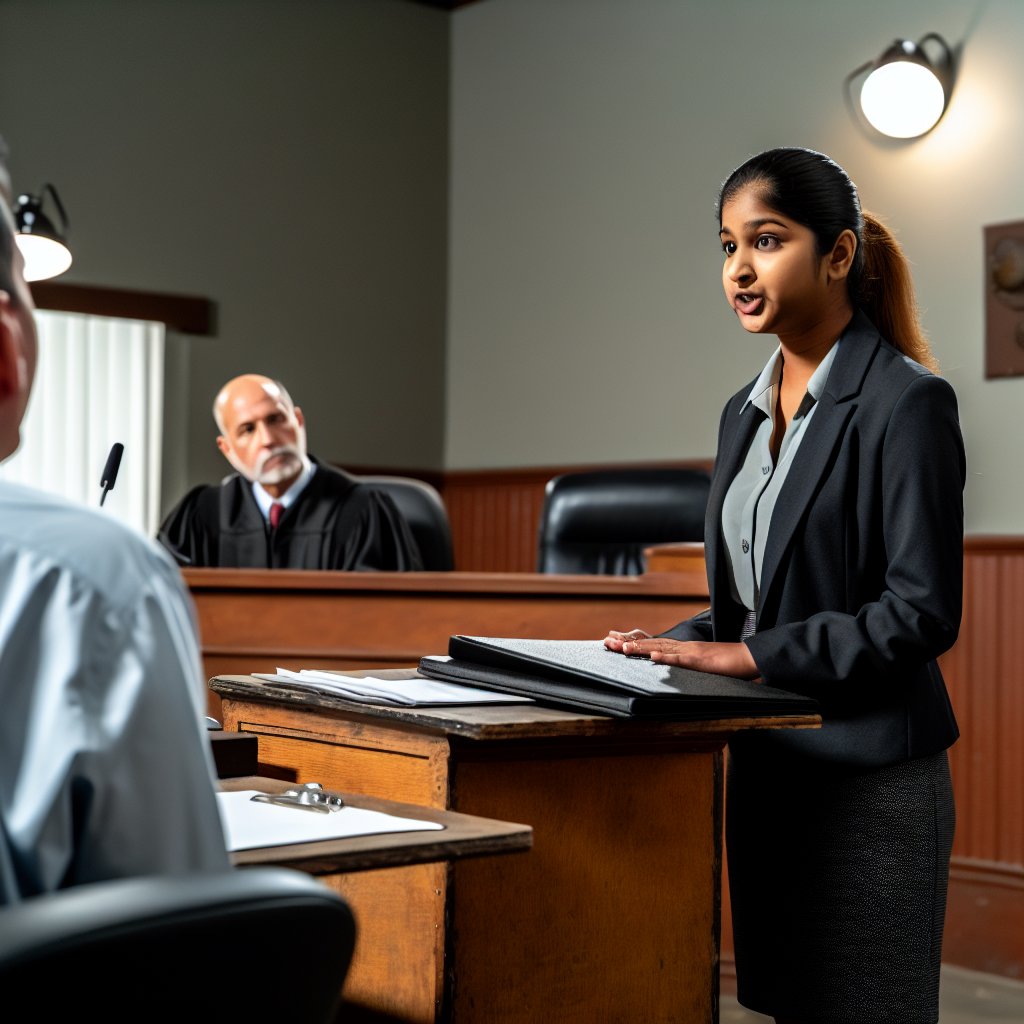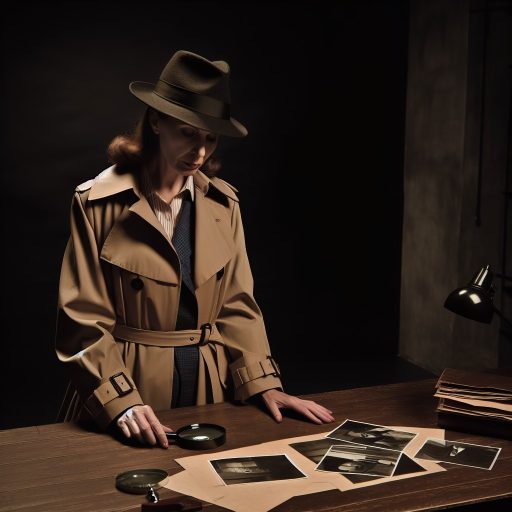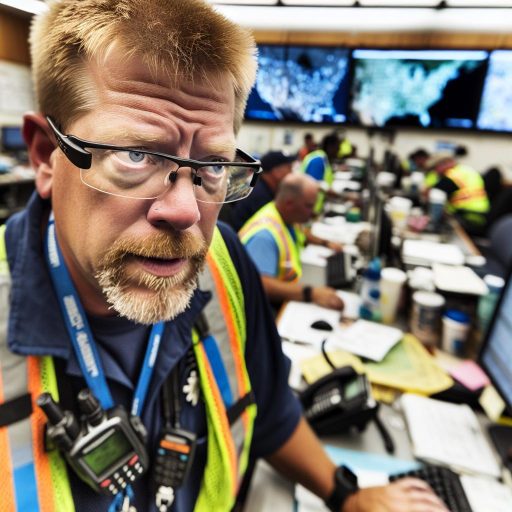Introduction:
A crime scene investigator plays a crucial role in court testimonies by providing expert analysis and evidence from crime scenes.
Their testimony is vital in criminal cases as it helps establish the facts and connect the evidence to the crime.
Training and Qualifications of Crime Scene Investigators
Educational Background and Certifications Required
Most CSIs have a minimum of a bachelor’s degree in forensic science or a related field.
Some may have a background in law enforcement or natural sciences.
Many agencies also require CSIs to have certifications, such as the Certified Crime Scene Investigator (CCSI) credential.
This credential demonstrates their expertise in the field.
CSIs often undergo rigorous background checks and testing to ensure they have the necessary skills and knowledge.
This preparation enables them to perform their duties effectively.
Specialized Training in Collecting and Preserving Evidence
CSIs receive specialized training in collecting and preserving different types of evidence, such as DNA, fingerprints, and trace evidence.
They are trained in proper evidence collection techniques to prevent contamination.
This training ensures that the evidence is admissible in court.
CSIs also learn how to document and photograph crime scenes.
This creates a detailed record of the evidence that can be used in court testimonies.
The training and qualifications of crime scene investigators are critical to their ability to accurately collect and preserve evidence.
Their expertise and attention to detail can make a significant impact on the outcome of criminal cases.
Collection and Preservation of Evidence at Crime Scenes
In the role of a crime scene investigator, one of the most crucial tasks is collecting and preserving evidence found at crime scenes.
-
Procedures Followed to Ensure Integrity of Evidence:
- Upon arrival at the crime scene, the investigator must first secure the area to prevent contamination of evidence.
- Photographs are taken to document the scene before any evidence is collected to ensure an accurate record.
- The investigator must wear appropriate protective gear to avoid tampering with evidence or leaving any traces behind.
- All evidence is carefully marked, labeled, and packaged to maintain its integrity and prevent cross-contamination.
- Chain of custody forms are filled out to track the movement of evidence from the crime scene to the laboratory for analysis.
-
Importance of Chain of Custody in Court Testimony:
- Chain of custody refers to the chronological documentation of the handling of evidence to ensure its integrity and admissibility in court.
- It serves as a crucial link that establishes the continuity and authenticity of evidence presented during the legal proceedings.
- The chain of custody helps to prove that the evidence presented in court is the same evidence collected at the crime scene without any alterations.
- It provides a clear record of who had possession of the evidence at all times, ensuring its reliability as legal proof.
- Without a properly maintained chain of custody, the integrity of the evidence may be called into question, leading to its inadmissibility in court.
Overall, the collection and preservation of evidence at crime scenes are fundamental tasks for a crime scene investigator. The adherence to strict procedures and chain of custody guidelines is essential for the successful presentation of evidence in court.
Explore Further: Cybersecurity Specialist vs. Cybersecurity Analyst: Key Differences
Analysis of evidence in the laboratory
In order to prepare for court testimonies, crime scene investigators must carefully analyze all evidence collected from a crime scene in the laboratory.
This process involves using advanced technology and techniques to uncover crucial information.
Transform Your Career Today
Unlock a personalized career strategy that drives real results. Get tailored advice and a roadmap designed just for you.
Start NowUse of advanced technology and techniques
- One of the most important aspects of analyzing evidence is the use of advanced technology such as DNA analysis, fingerprint matching, and chemical testing.
- Crime scene investigators utilize specialized equipment to examine evidence in detail, ensuring that no crucial information goes unnoticed.
- Techniques such as chromatography, spectroscopy, and microscopy are commonly employed to identify and analyze different types of evidence.
- By incorporating cutting-edge technology and techniques, investigators can uncover vital clues that can help solve a case and secure convictions in court.
How findings are presented in court
- Once the analysis is complete, crime scene investigators must present their findings in a clear and concise manner in court.
- Investigators are often called to testify about the results of their analysis and explain how they arrived at their conclusions.
- Findings are typically presented through a combination of verbal testimony and visual aids such as photographs, charts, and graphs.
- Investigators must be prepared to answer questions from both the prosecution and defense attorneys regarding their analysis and the evidence they collected.
- The goal of presenting findings in court is to provide the judge and jury with a thorough understanding of the evidence and its significance in the case.
You Might Also Like: Benefits and Perks of Being a Border Patrol Agent
When it comes to the role of a Crime Scene Investigator in court testimonies, collaboration with other forensic experts plays a crucial role.
Working hand in hand with professionals such as forensic scientists, DNA analysts, and more is essential to ensure accurate and reliable findings are presented in court.
Working with Forensic Scientists
Crime Scene Investigators often work closely with forensic scientists to analyze evidence collected from a crime scene.
This collaboration helps in determining the significance and relevance of the evidence in the investigation.
Forensic scientists provide valuable insights into the type of evidence found, the techniques used for analysis, and the conclusions drawn from the findings.
Providing Expert Opinions to Support Findings
Crime Scene Investigators are often called upon to provide expert opinions in court to support their findings.
These opinions are based on their expertise in examining and analyzing evidence collected from the crime scene.
By testifying in court, Crime Scene Investigators help the jury and judge understand the significance of the evidence and its role in the case.
Ensuring Accuracy and Reliability of Evidence
Collaborating with other forensic experts helps Crime Scene Investigators ensure the accuracy and reliability of the evidence presented in court.
By working together, they can cross-check findings, validate conclusions, and provide a more comprehensive overview of the case.
This collaborative effort is essential in maintaining the integrity of the investigation and upholding the standards of forensic science.
Delve into the Subject: Understanding the U.S. Marshals’ Jurisdiction
Preparation for court testimony
Being a crime scene investigator, preparing for court testimony is a crucial aspect of the job.
It requires a meticulous review of case files and evidence to ensure accuracy and confidence in delivering testimony.
- Reviewing case files and evidence
- Mock trials and practice sessions
Before appearing in court, CSI professionals must thoroughly review the case files and evidence related to the specific case they will be testifying about.
This helps them refresh their memory on the details and facts of the case.
Participating in mock trials and practice sessions can help crime scene investigators prepare for court testimony.
By simulating a courtroom setting and practicing answering questions, they can improve their communication skills and enhance their ability to present evidence effectively.
Proper preparation for court testimony is essential for crime scene investigators to successfully convey their findings and conclusions in a clear and concise manner.
Transform Your Career Today
Unlock a personalized career strategy that drives real results. Get tailored advice and a roadmap designed just for you.
Start NowGain More Insights: Importance of Discretion in Bodyguarding

Role of Crime Scene Investigators in Presenting Evidence in Court
Crime scene investigators play a crucial role in presenting evidence in court. They provide valuable information about evidence collection and analysis.
Testifying about Evidence Collection and Analysis
- Crime scene investigators are responsible for collecting and documenting evidence found at a crime scene.
- They must ensure that all evidence is properly collected, preserved, and analyzed to maintain its integrity.
- When testifying in court, investigators must accurately describe how each piece of evidence was collected and processed.
- They may be asked to explain the techniques and tools used during the collection and analysis process.
Answering Questions from Attorneys and Judges
- During court proceedings, crime scene investigators may be required to answer questions from attorneys and judges.
- They must be able to articulate their findings and conclusions in a clear and concise manner.
- Investigators must be prepared to explain the significance of each piece of evidence and how it relates to the case.
- They may also have to defend their methods and procedures used in the investigation if questioned by the defense.
Crime scene investigators play a vital role in court testimonies. Their testimony can significantly impact the outcome of a case. Their role is pivotal in the criminal justice system.
Cross-examination in court
When a crime scene investigator takes the stand in court, they must be prepared for cross-examination.
During cross-examination, the defense attorney will attempt to discredit the investigator’s findings and testimony.
The goal of cross-examination is to challenge the credibility and reliability of the investigator’s work.
Investigators must be ready to face tough questions and scrutiny of their methods in court.
It is crucial for investigators to remain calm, composed, and confident during cross-examination.
They should answer questions clearly and concisely, avoiding ambiguity or confusion in their responses.
Challenges faced by crime scene investigators
One of the main challenges faced by crime scene investigators during cross-examination is the pressure to defend their work.
Investigators may face aggressive questioning from defense attorneys, who will try to poke holes in their investigation.
They may also be confronted with conflicting evidence or witness testimonies that challenge their findings.
Additionally, investigators must be prepared to explain complex forensic techniques and methodologies in simple terms.
Another challenge is staying focused and attentive throughout the cross-examination process, which can be mentally taxing.
How to respond effectively under pressure
To respond effectively under pressure during cross-examination, crime scene investigators should be well-prepared and knowledgeable about their findings.
They should review their notes, reports, and evidence before taking the stand to ensure they are familiar with the details of the case.
Investigators should also be aware of potential weaknesses in their investigation and be ready to address them honestly and transparently.
Remaining calm and composed, even in the face of challenging questions, is essential for maintaining credibility and professionalism.
It is important for investigators to listen carefully to each question, take a moment to think before responding, and only answer what is asked.
By staying focused, confident, and truthful in their responses, crime scene investigators can effectively navigate cross-examination in court.
Transform Your Career Today
Unlock a personalized career strategy that drives real results. Get tailored advice and a roadmap designed just for you.
Start NowRole of Crime Scene Investigators in Justice
Crime scene investigators play a crucial role in court testimonies by providing vital evidence.
Their testimony can make or break a case, determining the fate of the accused.
Without their expert analysis, justice may not be served accurately.
Their attention to detail and dedication to uncovering the truth ensures that perpetrators are held accountable.
In sum, crime scene investigators are essential in delivering justice and maintaining the integrity of the legal system.




